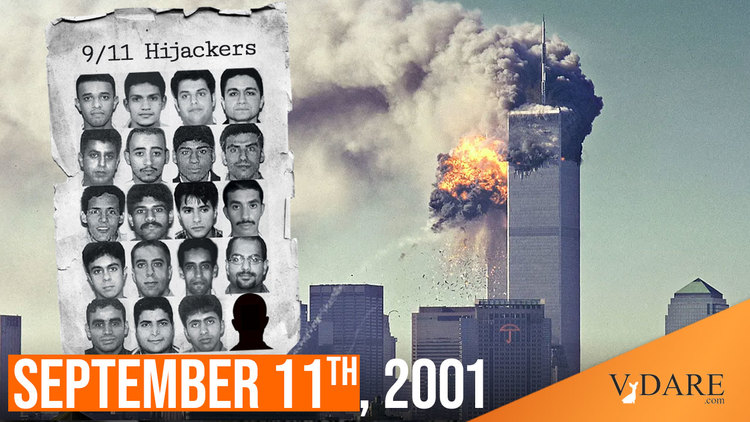
By Steve Sailer
09/14/2001
"Mr. [Bill] Clinton … said he supported the ultimate wisdom of a borderless world for people and for trade."
"Open borders to all:" Clinton Garry Barker, Melbourne Age 9-11-2001
"I think the nation-state is finished."
Robert Bartley Editor, Wall Street Journal Mid-1995
I sit in one of the dives On Fifty-second Street
Uncertain and afraid
As the clever hopes expire
Of a low dishonest decade:
Waves of anger and fear
Circulate over the bright
And darkened lands of the earth,
Obsessing our private lives;
The unmentionable odor of death
Offends the September night
W.H. Auden September 1, 1939
All changed, changed utterly
W.B. Yeats Easter 1916
The clever hopes of the low dishonest decade that began in the complacency following the glorious but painless triumphs of the Gulf War and the fall of the Soviet Union expired on Tuesday, September 11, 2001.
There may be no better memento of the deadness of that decade’s delusions than an article that appeared in an Australian newspaper that very morning, yet now seems as faded and fatuous as an account of Wendell Wilkie’s One-World campaign.
"[Bill Clinton] discussed the immigration issue in Australia and he took a position on it," said Tom Hogan, president of Vignette Corporation, host of the exclusive forum. "The [former] president believes the world will be a better place if all borders are eliminated — from a trade perspective, from the viewpoint of economic development and in welcoming [the free movement of] people from other cultures and countries," Mr. Hogan said. Mr. Clinton showed an understanding of the political problems Australia faced, but said he supported the ultimate wisdom of a borderless world for people and for trade. [Emphasis added].
That day was to bring us a foretaste of the "ultimate wisdom of a borderless world."
In response to the attacks, supposedly post-nationalist Americans united in one vast surge of that most unfashionable of emotions, patriotism. Watching 350 firemen run into the collapsing World Trade Center towers to die heroes' deaths, we born-again patriots instantly grasped — after a decade of low dishonest assurances that we should put our trust in UN Conferences or foreign presidentes or globalized markets — the simple but stern law of national survival, "We must love one another or die," love one another enough to sacrifice for our nation, even unto death.
It now seems unimaginably long ago, but it has only been days since the Great and the Good, whether Clinton or Clinton-Basher-in-Chief, were publicly trumpeting their smug dreams for — and bemoaning their subjects' benighted resistance to — the Brave New Borderless World.
All changed, changed utterly …
Our headline comes from a poem by the very unfashionable Rudyard Kipling. "Copybook" is British for "notebook." "Headings" refers to traditional proverbs or other ancient truths that teachers long ago assigned their students to write essays about. The moral is that unfashionable truths can’t be repressed — not even by "the Gods of the Market-Place," believed to be an early reference to the Wall Street Journal Editorial Page and libertarians (excepting, of course, for our paleolibertarian friends). For the complete poem, click here.
[Steve Sailer is founder of the Human Biodiversity Institute and
movie critic for
The American Conservative. His website www.iSteve.blogspot.com features his daily blog.]
September 14, 2001
This is a content archive of VDARE.com, which Letitia James forced off of the Internet using lawfare.